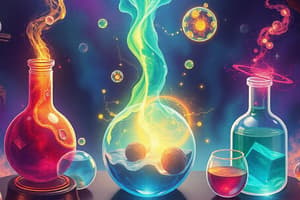Podcast
Questions and Answers
What distinguishes a scientific law from a scientific theory?
What distinguishes a scientific law from a scientific theory?
- Laws are based on observations, while theories are based on experiments.
- Laws are subject to change, while theories are immutable.
- Laws describe what happens, while theories explain why something happens. (correct)
- Laws explain why phenomena occur, while theories describe what happens.
Which of the following is NOT a component of scientific skills?
Which of the following is NOT a component of scientific skills?
- Imagination skills (correct)
- Analysis skills
- Observation skills
- Measurement skills
Why is scientific inquiry important for society?
Why is scientific inquiry important for society?
- It helps in creating technological advancements. (correct)
- It provides definitive answers without questioning.
- It eliminates the need for skepticism.
- It solely focuses on theoretical knowledge.
Which statement best describes the role of critical thinking in scientific methodology?
Which statement best describes the role of critical thinking in scientific methodology?
How do measurements contribute to scientific inquiry?
How do measurements contribute to scientific inquiry?
What is the first step in the scientific method?
What is the first step in the scientific method?
Which branch of science primarily focuses on the study of matter and energy interactions?
Which branch of science primarily focuses on the study of matter and energy interactions?
What does a hypothesis represent in the scientific method?
What does a hypothesis represent in the scientific method?
In which branch of science would you study genetics and evolution?
In which branch of science would you study genetics and evolution?
Which of the following best describes matter?
Which of the following best describes matter?
Which of the following is a key topic studied in Earth Science?
Which of the following is a key topic studied in Earth Science?
Which statement about energy is correct?
Which statement about energy is correct?
Flashcards
What is the scientific method?
What is the scientific method?
A process used to gather information, test ideas, and draw conclusions about the natural world.
What is a hypothesis?
What is a hypothesis?
A proposed explanation for an observation that can be tested through experiments.
What is physics?
What is physics?
The study of matter, energy, and their interactions.
What is matter?
What is matter?
Signup and view all the flashcards
What is energy?
What is energy?
Signup and view all the flashcards
What is biology?
What is biology?
Signup and view all the flashcards
What is Earth science?
What is Earth science?
Signup and view all the flashcards
What is astronomy?
What is astronomy?
Signup and view all the flashcards
Scientific Law
Scientific Law
Signup and view all the flashcards
Scientific Theory
Scientific Theory
Signup and view all the flashcards
Causality
Causality
Signup and view all the flashcards
Systems
Systems
Signup and view all the flashcards
Measurements
Measurements
Signup and view all the flashcards
Study Notes
Introduction to Science
- Science is a systematic enterprise that builds and organizes knowledge in the form of testable explanations and predictions about the universe.
- It encompasses a wide range of disciplines, including physics, chemistry, biology, and astronomy.
- The scientific method is a process used to gather and analyze information, and to develop testable explanations.
The Scientific Method
- Observation: Identifying a phenomenon or pattern in the natural world.
- Question: Formulating a question about the observed phenomenon.
- Hypothesis: Proposing a testable explanation for the observed phenomenon.
- Prediction: Formulating a specific, testable statement about what will happen if the hypothesis is correct.
- Experimentation: Designing and conducting experiments to test the prediction.
- Analysis: Evaluating the results of the experiment.
- Conclusion: Drawing a conclusion based on the analysis of the experimental results; either supporting or refuting the hypothesis.
- Communication: Sharing findings and conclusions with the scientific community.
Branches of Science
- Physics: The study of matter, energy, and their interactions. Key topics include mechanics, thermodynamics, electromagnetism, and nuclear physics.
- Chemistry: The study of the composition, structure, properties, and reactions of matter. Key concepts include atomic structure, bonding, reactions, and stoichiometry.
- Biology: The study of living organisms and their interactions with the environment. Key areas include cell biology, genetics, ecology, and evolution.
- Earth Science: The study of the Earth's systems, including the atmosphere, hydrosphere, geosphere, and biosphere. Sub-disciplines include geology, meteorology, oceanography, and environmental science.
- Astronomy: The study of celestial objects, such as stars, planets, galaxies, and the universe as a whole.
Key Concepts in Science
- Matter: Anything that occupies space and has mass.
- Energy: The capacity to do work or cause change.
- Forces: Interactions that can change the motion of an object.
- Motion: The change in position of an object over time.
- Time: A continuous sequence of events that occur in a specific order.
- Space: The boundless three-dimensional extent in which objects and events have relative position and direction.
- Causality: Relationships between events or phenomena, where one event or phenomenon is dependent on, or directly caused by, another event or phenomenon.
- Systems: Sets of interacting parts forming a complex whole.
- Measurements: Quantifying physical properties using standardized units.
Scientific Laws and Theories
- Scientific Law: A statement that describes a natural phenomenon or pattern in the natural world. It is based on repeated observations and experiments. Laws describe what happens.
- Scientific Theory: A well-substantiated explanation of some aspect of the natural world that incorporates facts, laws, inferences, and tested hypotheses. Theories explain why something happens.
The Importance of Scientific Inquiry
- Scientific investigation is critical for understanding the universe around us.
- Scientific knowledge allows us to address societal challenges and improve the quality of life.
- Scientific progress is driven by curiosity, skepticism, and rigorous testing.
- Critical thinking and skepticism are essential components of scientific methodology.
Scientific Skills
- Observation skills are crucial for noticing details and patterns.
- Measurement skills involve using instruments to accurately record data.
- Analysis skills facilitate interpretation of data to draw conclusions.
- Communication skills allow scientists to share findings.
Studying That Suits You
Use AI to generate personalized quizzes and flashcards to suit your learning preferences.



